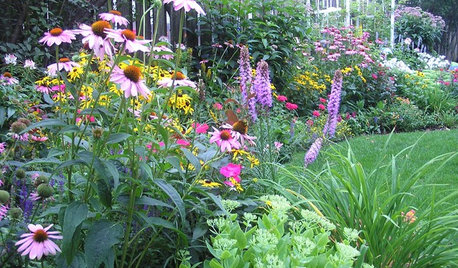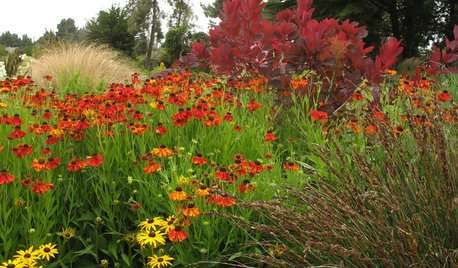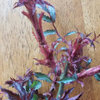why not try organics...
serenasyh
14 years ago
Related Stories

HOUSEKEEPINGGot a Disastrously Messy Area? Try Triage
Get your priorities straight when it comes to housekeeping by applying an emergency response system
Full Story
LANDSCAPE DESIGNTry Slow Gardening for Some Unexpected Benefits
Why set your garden on the fast track? Here's how to relax and enjoy it in an entirely new way
Full Story
PLANTING IDEASWant a More Colorful, Natural Garden? Try a Perennial Meadow
Spend less time tending and more time taking in the sights by improving on Victorian and prairie garden designs
Full Story
KITCHEN DESIGNLove to Bake? Try These 13 Ideas for a Better Baker's Kitchen
Whether you dabble in devil's food cake or are bidding for a bake-off title, these kitchen ideas will boost your baking experience
Full Story
DECORATING GUIDES5 Decor Trends to Try — and 5 to Rethink
Some style trends are worth jumping onboard. Others you may want to let fade from your memory
Full Story
MOST POPULARMust-Try Color Combo: White With Warm Off-White
Avoid going too traditional and too clean by introducing an off-white palette that brings a touch of warmth and elegance
Full Story
KITCHEN DESIGNTry a Copper Sink for a Warm Glow in the Kitchen
Bring polish and patina to your kitchen with a sink done in endlessly interesting copper
Full Story
DECORATING GUIDES28 Decorating Moves to Try This Month
Treat your interiors to a pick-me-up with these quick and cheerful decorating tricks
Full Story
WALL TREATMENTSTempted to Try Wallpaper? 10 Tips for Finding the Right Pattern
Before you lay down a lot of cash, sit down with this advice for getting a wallpaper you’ll love for years
Full Story
BEDROOMSNew This Week: 3 Bed, Nightstand and Wall Combos You’ve Got to Try
Whether you prefer moody, minimalist or sunny, these 3 bedrooms uploaded to Houzz recently are exercises in stylish harmony
Full StoryMore Discussions









buford
newyorkrita
Related Professionals
Oatfield Landscape Architects & Landscape Designers · Saint Louis Park Landscape Architects & Landscape Designers · Wixom Landscape Architects & Landscape Designers · Buford Landscape Contractors · Norwood Landscape Contractors · Bound Brook Landscape Contractors · Euclid Landscape Contractors · Madera Landscape Contractors · McLean Landscape Contractors · Midland Landscape Contractors · Natick Landscape Contractors · New Braunfels Landscape Contractors · North Haven Landscape Contractors · Woodland Landscape Contractors · Winter Gardens Landscape Contractorssunnishine
Zyperiris
eeekk
buford
greenhaven
diane_nj 6b/7a
serenasyhOriginal Author
buford
veilchen
Cindy Ehrenreich
diane_nj 6b/7a
anntn6b
gagnon98
newyorkrita
lucretia1
buford
diane_nj 6b/7a
mori1
texaslynn
serenasyhOriginal Author
ingrid_vc so. CA zone 9
buford
serenasyhOriginal Author
anntn6b
buford
serenasyhOriginal Author
Cindy Ehrenreich
anntn6b
Zyperiris
buford
diane_nj 6b/7a
michaelg
timberling
bellarosa
iowa_jade
anntn6b
lucretia1
rosesinny
serenasyhOriginal Author